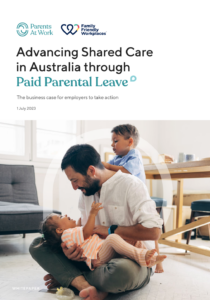
“The more generous you are, the shorter your policy can be. If you’re unable to be as generous as you’d like to be, the biggest tip I would give is that your policy needs to be structured in a way that it can be understood by employees because [the laws around it are] very complicated.”
Michael Starkey
Senior Associate, Baker McKenzie
Parents At Work hosted a live session for its employer members on the implications and opportunities of the recent changes to the Commonwealth-funded paid parental leave scheme and the considerations for employer-funded schemes.
The discussion featured a panel of experts including guest speakers Louise Campbell and Michael Starkey from Baker McKenzie and Kirsty Charlton from PepsiCo, who shared their insights and experiences on designing and implementing best practice parental leave policies that support gender equality, talent retention and employee wellbeing.
Parental leave best practice is clearly a topic which resonates with many of our employers – highlighting a need for clear, practical guidance.
We gathered some valuable insights into the understanding of how the recent changes to legislation are administered alongside employer-funded schemes, and what the biggest challenges organisations are grappling with.
What arose from the session were that organisations are encountering some of the following issues:
The session included a poll to assess employer sentiment and understanding following the changes to government PL legislation:



The main points and recommendations from the webinar were:
 For further support you can contact one of our expert consultants or read our recent white paper: Advancing Shared Care in Australia through Paid Parental Leave highlighting the continuing shifts employers are making to evolve their PPL policies.
For further support you can contact one of our expert consultants or read our recent white paper: Advancing Shared Care in Australia through Paid Parental Leave highlighting the continuing shifts employers are making to evolve their PPL policies.


